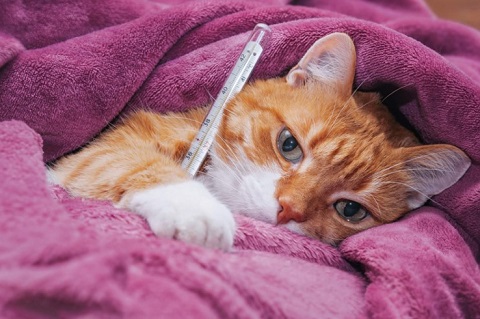WARNING! SARS-CoV-2 Infections Are Widespread In Cats And Could Lead To Mutations Escaping Human Immunity Upon Spillback
Nikhil Prasad Fact checked by:Thailand Medical News Team May 26, 2024 7 months, 3 weeks, 5 days, 11 hours, 30 minutes ago
An Alarming Trend in Brazil
COVID-19 News: A recent study conducted by an international team of researchers from Humboldt-Universität zu Berlin, Tecsa Laboratorios, the Federal University of Bahia, and other institutions has uncovered concerning findings about the spread of SARS-CoV-2 in domestic cats across Brazil. The research covered in this
COVID-19 News report had aimed to investigate the prevalence of SARS-CoV-2 in cats and to understand if pre-existing immunity to enzootic coronaviruses in these animals impacts their susceptibility to the virus.
 SARS-CoV-2 Infections Are Widespread In Cats And Could Lead To
SARS-CoV-2 Infections Are Widespread In Cats And Could Lead To
Mutations Escaping Human Immunity Upon Spillback
Pic Credit: @alenadzemidziuk / Freepik
High Susceptibility Among Carnivores
Carnivores, including cats and minks, have shown a high susceptibility to SARS-CoV-2. This susceptibility has been particularly notable in Brazil, a global COVID-19 hotspot, where numerous cases of human-to-cat transmission have been documented. The study sampled 547 domestic cats from seven states in southern, southeastern, and northeastern Brazil between July and November 2020.
Prevalence of Infection
The researchers found that the overall seroprevalence of SARS-CoV-2 in Brazilian cats was 7.3%, as confirmed by the plaque reduction neutralization test (PRNT90). This prevalence was consistent across different states, suggesting homogeneous infection levels. Interestingly, the cats had significantly higher neutralizing antibody titers against the Gamma variant of concern, which was prevalent in Brazil during 2020, compared to an earlier SARS-CoV-2 B.1 isolate.
Implications of Pre-Existing Immunity
One of the study's key objectives was to determine if pre-existing immunity to enzootic coronaviruses in cats influenced their susceptibility to SARS-CoV-2. The results indicated that neither the magnitude of SARS-CoV-2 antibody titers nor the infection status was affected by the serostatus of Feline coronavirus (FCoV). This suggests that pre-existing immunity to enzootic coronaviruses neither prevents nor enhances SARS-CoV-2 infection in cats.
Carnivores and SARS-CoV-2
SARS-CoV-2, which has evolutionary origins in bats, emerged in humans in late 2019. Beyond humans, carnivores are particularly vulnerable to the virus. By late 2021, natural SARS-CoV-2 infection had been observed in various carnivores, including dogs, lions, tigers, ferrets, and minks. Infected cats often exhibit respiratory and gastroenteric symptoms such as sneezing, coughing, nasal and ocular discharge, anorexia, vomiting, diarrhea, and appetite loss. However, COVID-19 in cats remains poorly understood.
Transmission Dynamics
r />
Evidence from several countries has shown that cats can be easily infected with SARS-CoV-2, primarily from infected humans but also from other animals such as minks and other cats. During the 2003-2004 SARS outbreak, it was speculated that mutations enabling efficient human infection may have arisen in carnivore intermediate hosts. In minks, SARS-CoV-2 mutations have resulted in strains capable of infecting humans and showing reduced neutralization by human serum samples.
Detailed Findings - Set-Up of Serological Testing
To assess if pre-existing immune responses against enzootic coronaviruses or other pathogens affect SARS-CoV-2 antibody testing, the researchers tested pre-pandemic sera using a receptor-binding domain (RBD)-based SARS-CoV-2 surrogate virus neutralization test (sVNT). This test, specific for human antibody responses, surprisingly found one cat sample that was clearly positive, suggesting the need for confirmation by PRNT. Subsequent testing focused on the Gamma variant of concern, which was prevalent during the study period.
Pandemic Sampling
The study tested 547 cat sera sampled during the second half of 2020 across seven Brazilian states. The overall seroprevalence confirmed by PRNT90 was 7.3%, with regional differences in seroprevalence being statistically insignificant. The researchers also noted no significant correlation between cumulative human incidence and cat seroprevalence, suggesting that cats may not be a reliable proxy for human infection rates.
Enzootic Coronavirus Antibodies
Testing for antibodies against enzootic coronaviruses revealed that a subset of 68 pandemic sera and 52 pre-pandemic sera contained low levels of Bovine coronavirus (BCoV)-specific neutralizing antibodies (1.7%). In contrast, FCoV-specific neutralizing antibodies were detected in 33.3% of cats. The median PRNT90 endpoint titer among seropositive sera was higher for SARS-CoV-2 than for FCoV, supporting the hypothesis of a relatively recent SARS-CoV-2 infection in these cats.
High Seroprevalence and Epidemiological Significance
The study's findings reveal a high seroprevalence of SARS-CoV-2 in Brazilian cats as early as late 2020. This high rate likely reflects the intense transmission of SARS-CoV-2 in humans during the study period. The seroprevalence in Brazilian cats was higher than those reported from domestic cats in Europe during early 2020, aligning with less intense SARS-CoV-2 circulation in Europe at that time.
Cross-Protection and Immune Interplay
The immune interplay between different coronaviruses in various hosts is poorly understood. In humans, immunity against common cold coronaviruses has been reported to afford cross-protection against subsequent SARS-CoV-2 infection. However, the study found no evidence that pre-existing immunity against enzootic carnivore coronaviruses protects against or enhances SARS-CoV-2 infection in cats.
Potential for Mutations and Future Risks
One significant concern raised by the study is the potential for SARS-CoV-2 mutations to emerge in cats that could escape human immunity upon spillback. This underscores the importance of genetic characterization of SARS-CoV-2 strains from both cats and humans in a One Health framework. Such monitoring could enable early detection of cat-associated SARS-CoV-2 variants and inform potential preventive measures, such as animal vaccination.
Conclusion
The study highlights the frequent and widespread infection of cats with SARS-CoV-2 in Brazil during the first year of the pandemic. The findings suggest that pre-existing immunity to enzootic coronaviruses in cats does not significantly affect their susceptibility to SARS-CoV-2. Given the potential for mutations and the close contact between cats and humans, ongoing surveillance and research are crucial to understanding and mitigating the risks posed by SARS-CoV-2 in domestic animals.
The study findings were published in the peer reviewed journal: Frontiers in Immunology.
https://www.frontiersin.org/journals/immunology/articles/10.3389/fimmu.2022.857322/full
For the latest COVID-19 News, keep on logging to Thailand Medical News.
Read Also:
https://www.thailandmedical.news/news/thailand-medical-researchers-find-that-up-to-22-67-percent-of-cats-tested-during-the-last-five-covid-19-waves-were-seropositive 